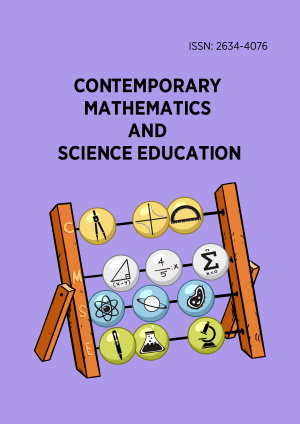Research Article
Relationship between familiarity and competency in integrating information and communication technology into mathematics instruction
More Detail
1 Department of Basic Education, Faculty of Educational Studies, University of Education, Winneba, GHANA* Corresponding Author
Contemporary Mathematics and Science Education, 4(2), July 2023, ep23022, https://doi.org/10.30935/conmaths/13405
Submitted: 03 February 2023, Published Online: 18 June 2023, Published: 01 July 2023
OPEN ACCESS 1447 Views 883 Downloads
ABSTRACT
Government, through the National Council for Curriculum and Assessment implemented new educational reforms in 2019. Paramount among the tenets in the new reforms is information and communication technology (ICT). However, there was an inadequate research on mathematics teachers’ familiarity and competency levels. The study, as proscribed in the positivist paradigm, applied a descriptive survey design in a cross section of the participants. All 75 mathematics teachers from the public junior high schools were conveniently sampled and participated in this study. In the instrumentation, the researchers used the structured questionnaire to collect data. With the help of statistical package for service solutions version 25, the researchers analyzed the data through the means and their associated standard deviations. It came to light that student-teachers’ moderate familiarity and competency level of integrating ICT in mathematics instruction was predominant. Notwithstanding, familiarity level was a significant predictor of their competency level. It was thus suggested that mathematics teachers should take matters of familiarity and competency levels as key factors determining ICT integration for mathematics instruction.
CITATION (APA)
Yeng, E., Ali, C. A., & Adzifome, N. S. (2023). Relationship between familiarity and competency in integrating information and communication technology into mathematics instruction. Contemporary Mathematics and Science Education, 4(2), ep23022. https://doi.org/10.30935/conmaths/13405
REFERENCES
- Alhashem, F., Agha, N., & Mohammad, A. (2022). Required competencies for e-learning among science and mathematics supervisors: Post-pandemic features of education. International Journal of Information and Learning Technology, 3(1), 240-255. https://doi.org/10.1108/IJILT-07-2021-0108
- Aslan, A., & Zhu, C. (2016). Investigating variables predicting Turkish pre-service teachers’ integration of ICT into teaching practices. British Journal of Educational Technology, 48(2), 552-570. https://doi.org/10.1111/bjet.12437
- Cohen, L., Manion, L., & Lawrence, K. (2018). Research methods in education. Routledge. https://doi.org/10.4324/9781315456539
- Creswell, J. W., & Creswell, J. D. (2017). Research design: Qualitative, quantitative, and mixed methods approaches. SAGE.
- Esfijani, A., & Zamani, B. E. (2020). An investigation of the relationship between self-efficacy beliefs about technology integration and technological pedagogical content knowledge (TPACK) among preservice teachers’. Journal of Digital Learning in Teacher Education, 27, 134-143. https://doi.org/10.1080/21532974.2011.10784670
- González-Pérez, L. I., & Ramírez-Montoya, M. S. (2022). Components of Education 4.0 in 21st century skills frameworks: Systematic review. Sustainability, 14(3), 1493. https://doi.org/10.3390/su14031493
- Haji Ismail, N. F., Shahrill, M., & Asamoah, D. (2023). Learning through virtual manipulatives: Investigating the impact of Gizmos-based lessons on students’ performance in integers. Contemporary Mathematics and Science Education, 4(1), ep23009. https://doi.org/10.30935/conmaths/12857
- Kaleli-Yilmaz, G. (2015). The views of mathematics teachers on the factors affecting the integration of technology in mathematics courses. Australian Journal of Teacher Education, 40(8), 8. https://doi.org/10.14221/ajte.2015v40n8.8
- Ministry of Education. (2019). New curriculum for upper primary (basic 4-6). National Council for Curriculum and Assessment.
- Netsianda, A., & Ramaila, S. (2021). The use of ict in mathematics teaching and learning in South African secondary schools. In Proceedings of the 13th International Conference on Education and New LearningTechnologies. https://doi.org/10.21125/edulearn.2021.0173
- Nwosu, J. C., John, H. C., Izang, A. A., & Akorede, O. J. (2018). Assessment of information and communication technology (ICT) competence and literacy skills among undergraduates as a determinant factor of academic achievement. Educational Research and Reviews, 13(15), 582-589. https://doi.org/10.5897/ERR2018.3539
- Okolije, E. O. (2016). Knowledge, accessibility and use of information communication technology (ICT) among students and teachers in the Department of Nursing Sciences University of Nigeria, Enugu Campus [Doctoral dissertation, University of Nigeria, Nsukka].
- Onwuagboke, B. B. C., Singh, T. K. R., & Fook, F. S. (2015). Need for ICT integration for ffective instructional delivery in Nigerian colleges of education. Journal of Education and Practice, 6(3), 51-56.
- Padayachee, K. (2017). A snapshot survey of ICT integration in South African schools. South African Computer Journal, 29(2), 36-65. https://doi.org/10.18489/sacj.v29i2.463
- Perienen, A. (2020). Frameworks for ICT integration in mathematics education–A teacher’s perspective. EURASIA Journal of Mathematics, Science and Technology Education, 16(6), em1845. https://doi.org/10.29333/ejmste/7803
- Sawyerr, A. (2021). Exploring teachers’ perceived use of ICT in classroom instruction using the will-skill-tool-pedagogy model [Master’s thesis, University of Cape Coast]. https://doi.org/10.1007/s10639-022-11234-x
- Tambara, C. T. (2015). Unpacking teachers’ pedagogical content knowledge and skills to develop learners’ problem-solving skills [Doctoral dissertation, Stellenbosch University].
- Teo, T., & Milutinovic, V. (2015). Modelling the intention to use technology for teaching mathematics among pre-service teachers in Serbia. Australasian Journal of Educational Technology, 31(4), 363-380. https://doi.org/10.14742/ajet.1668
- Uluyol, C., & Sahin, S. (2016). Elementary school teachers’ ICT use in the classroom and their motivators for using ICT. British Journal of Educational Technology, 47(1), 65-75. https://doi.org/10.1111/bjet.12220

 The articles published in this journal are licensed under the CC-BY Creative Commons Attribution International License.
The articles published in this journal are licensed under the CC-BY Creative Commons Attribution International License.